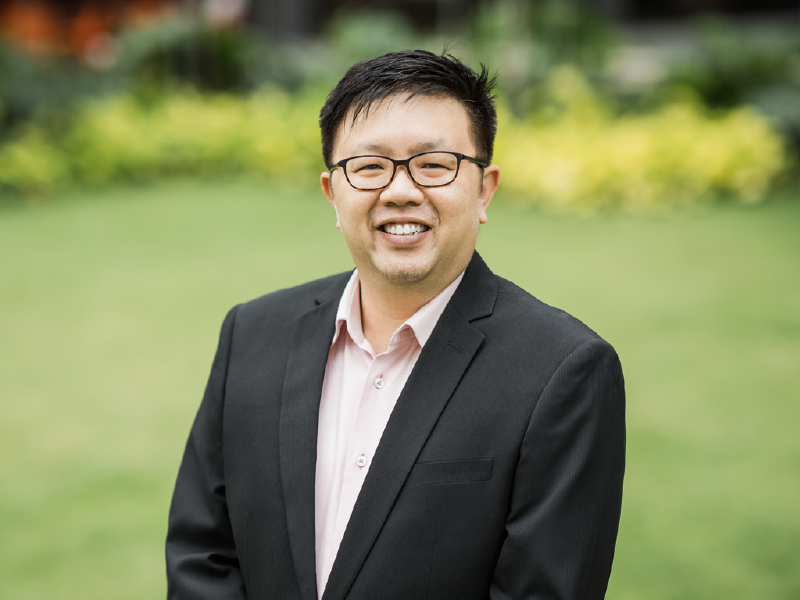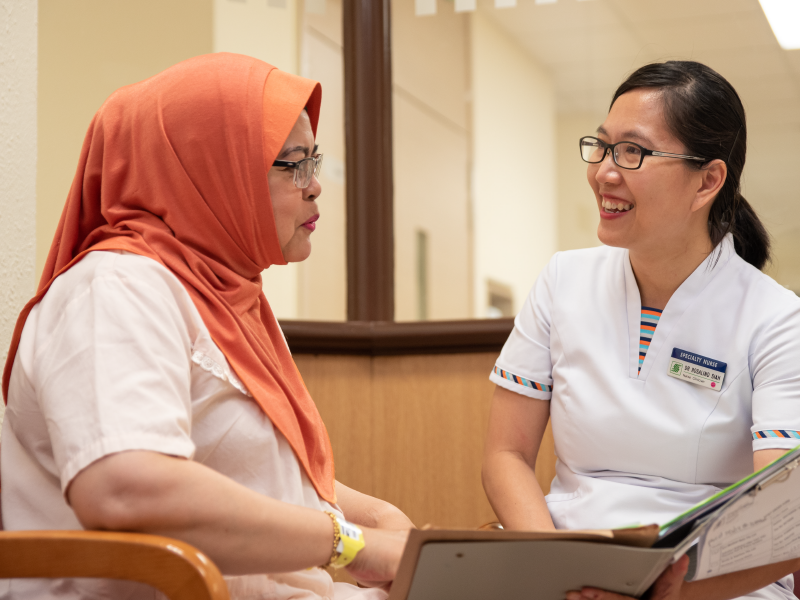Keeping Sharp with an Active Clinical Practice

Dr Zhou Wentao (right) sees a patient with Parkinson’s disease at her home. Photo Credit: SingHealth
An increasing number of NUS Alice Lee Centre for Nursing Studies (NUS Nursing) faculty is serving as nurse clinicians and advanced practice nurses, in addition to their roles as educators at the University. Here, we feature some of our educators who not only develop nurses at baccalaureate and graduate levels, but also demonstrate a commitment to providing direct patient care in hospitals and in the community.
Dr Zhou Wentao is Senior Lecturer at NUS Nursing and Director of its Master of Nursing programme, which trains advanced practice nurses (APNs) for Singapore’s healthcare sector. She also works as an APN at the National Neuroscience Institute.
In her practice, Dr Zhou cares for patients in the advanced stages of Parkinson’s disease in their homes. For many of these patients, the disease has taken a toll on their mobility and rendered regular visits to the doctors unfeasible.
“I see these patients in between their biannual doctor’s appointment to prevent complications that could arise and cause them to be readmitted into the hospital,” says Dr Zhou, adding that since she came on board, the physicians could reduce the time in between their patients’ appointments to once every nine months or even longer.
Going to her patients’ homes allows DrZhou to assess them more holistically, taking into account the social and environmental factors in the management of their illness and its co-morbidities, instead of just looking from the medical perspective.
“The beauty of a home visit is the ability to explore these home-based factors and build relationships with the patient’s family members, which a 15-minute clinic consultation cannot achieve,” adds Dr Zhou, who has a list of 62 active patients.
During her visits, Dr Zhou takes the opportunity to conduct advanced care planning discussions with family members. She also educates them to better understand the disease and plan for future care.
One of the most important outcomes of having advanced practice nurses in hospitals, clinics and the community is the level of knowledge they bring in reshaping local healthcare. As an APN herself, Dr Zhou believes that with advanced clinical training, APNs acquire critical-thinking skills and competencies to address complex healthcare needs of individuals and families. They are equipped to “reform” healthcare to promote health by empowering consumers, as well as improving care accessibility and affordability.
“Going out to practise and being on par with the rapidly changing needs of our local healthcare sector allows me to bring practical relevance to the programme. It also enhances my confidence and competency in training leaders who can think differently; and encourage them to identify and solve problems in their practice environments,” says Dr Zhou.
The beauty of a home visit is the ability to explore these homebased factors and build relationships with the patient’s family members, which a 15-minute clinic consultation cannot achieve.
– Dr Zhou Wentao, Senior Lecturer at NUS Nursing and Director of Master of Nursing Programme

Dr Shawn Goh
Dr Shawn Goh, an Assistant Professor of Nursing, is a Master’sprepared mental health nurse. He is also a member of the community psychiatric unit of the National University Hospital, known as the Assessment and Shared Care Team (ASCAT).
Dr Goh conducts home visits in Western Singapore where he sees patients referred to ASCAT by Family Service Centres (FSCs), Residents’ Committees (RCs) and other grassroots organisations. These patients often have a combination of psychiatric and underlying medical conditions but are not willing to leave their homes to seek medical and/or psychiatric help for some reason.
“We assess the patients’ mental wellbeing and look at the psychosocial factors that may impede them from seeking medical help,” explains Dr Goh.
“As a mental health nurse, my experience and understanding of the conditions and treatment modalities allow me to establish rapport and build relationships with my patients, which is key to getting them on a medical or psychiatric treatment programme,” says Dr Goh.
Another important prong of his work is conducting psychoeducation for patients. He also runs regular talks at FSCs, RCs and even at police divisions to educate frontline staff on how to identify and communicate with people with mental health needs. In addition, Dr Goh conducts research with ASCAT to improve psychiatric community care.
He believes the academic-practice link, a model practised only by our faculty, makes the NUS Nursing programme stand out. “It brings about currency of knowledge and practice, and dispels the notion that teachers are in their ivory towers. This level of expertise ensures both the relevance and applicability of instruction that take place within the school.”
Nursing students also appreciate the opportunity to learn from his direct experience. “Nothing beats the sharing of experience from the field and learning from actual clinical cases versus textbook ones —and from the students’ feedback I can see that they appreciate this too,” says Dr Goh.
We assess the patients’ mental wellbeing and look at the psychosocial factors that may impede them from seeking medical help.
– Dr Shawn Goh, Assistant Professor of Nursing

Dr Rosalind Siah interviews an elderly patient at Ward 63 of SGH where she evaluates and assesses these patients to improve geriatric care.
Dr Rosalind Siah is a lecturer at NUS Nursing. She is also a nurse clinician (specialty care) focusing on geriatric care at the Singapore General Hospital.
There are occasions when she finds herself working alongside her students and ex-students at Ward 63, where she makes clinical rounds to evaluate elderly patients, many of whom have sustained fractures from a fall, or suffer from depression and dementia. She also reviews patient records to understand medical histories and reasons for admission.
Dr Siah’s practice is of personal importance to her, apart from the benefit it provides students. “I’ve always wanted to work with the elderly since I started out as a nurse,” she says. When she first began basic nursing work, geriatrics as a specialist discipline was not as highly emphasised as it is now. Her work now improves patient care, she adds, which is crucial in addressing the needs of Singapore’s rapidly ageing population.
Maintaining an active practice also helps Dr Siah establish credibility among students and allows her to teach beyond the textbook. “Working within the profession keeps my clinical knowledge and skills up-to-date, allowing me to bring real-world expertise into the classroom to help students bridge the learning gap,” she says.
It also gives her a clearer identity as a nurse educator, she adds, as she believes that patient care is an integral part of nursing.
Dr Siah’s involvement in geriatric practice has also been valuable in strengthening clinical partners’ trust in NUS Nursing’s geriatric curriculum, in addition to keeping the curriculum relevant to Singapore’s context.
“Last year, we met with the various healthcare sector partners to realign our curriculum on geriatrics, and because I had an understanding of the current issues, our curriculum could stand up to scrutiny in terms of its relevancy to Singapore’s context. Our partners trust us since we are working in geriatrics as well,” she says.
Working within the profession keeps my clinical knowledge and skills up-to-date, allowing me to bring real-world expertise into the classroom to help students bridge the learning gap.
– Dr Rosalind Siah, Lecturer at NUS Nursing
